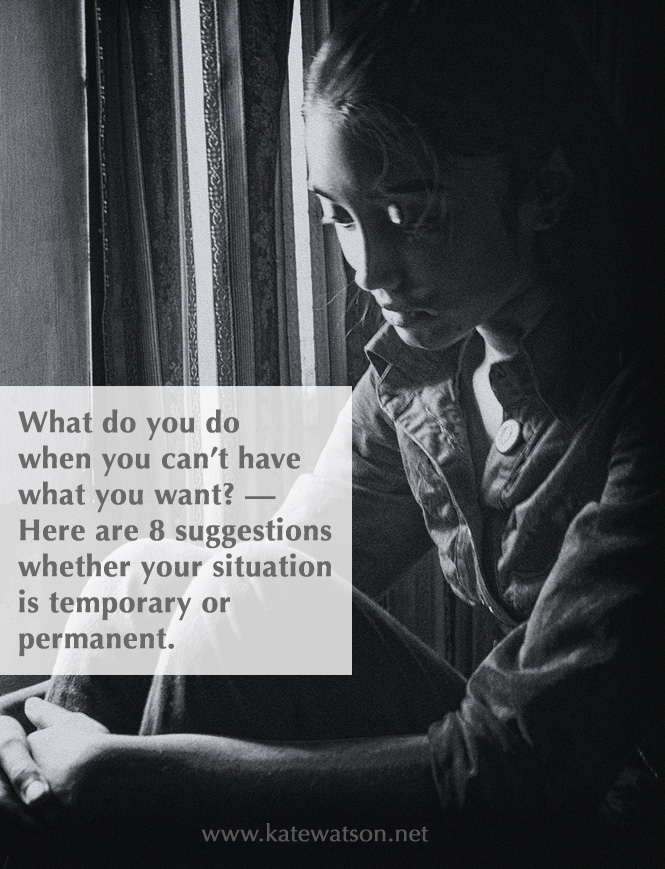One of my key lessons this year is acceptance. I brought it upon myself, of course, by choosing “accept” as my word for 2015. I knew I had these lessons to learn.
Last week, after I wrote about letting go of others’ expectations, I started thinking about what happens when you can’t meet your own expectations. Unless you’re a minimalist or highly evolved soul, you probably have a wish list, a vision board, or goals for your future. We all want something.

But what happens when you can’t have what you want?
Right now, for example, I want a house and family. I’m past my mid-30s, have been married almost 10 years, and I want what other people my age have. Or should I say: What I perceive other people my own age to have.
The problem? The hubs and I live in a neighborhood where starter homes go for about $1 million and my husband, who works his butt off at an Internet startup, isn’t ready to grow our family. Regardless of our ages, my wishes, or our previous agreements, the fact is what I want isn’t possible right now.
There’s very little I can do about either situation. On the home-buying front, prices rose 13% this past year and homes are typically selling $100k over list in bidding wars. These are facts. What we can do is either tighten our belts and save more, or move outside the Bay Area.
On the adoption front, there’s literally nothing I can do. My friends have posed solutions, including giving Brian an ultimatum, starting the process without him, or accepting that he may never be ready. I know these suggestions are well intentioned, but they’re awful, aren’t they? Either I manipulate my husband, go behind his back, or just give up.
Call me crazy, but none of those works for me. So what can you do when you want something you can’t have? I have asked myself this question many times. I think the answer depends in part on what it is you want and how likely it is to ever occur.
When you can’t have what you want…for now
If your situation is temporary, here are some things to try:
- Distract yourself. Psychologist Pauline Wallin, Ph.D. says that when we don’t get what we want, we want it even more. But each of us has a choice as to what we focus on. Instead of obsessing over what we don’t have, we can choose to do something else like start a new project, clean the house, or change the topic of conversation.
- Make a plan. I’m a planner, my husband is not. He and I drafted a timeline for adoption, but then he said our plan was unfolding too quickly so we put it on hold. The lesson here is that plans aren’t perfect and may change, particularly when you’re dealing with another person. However, planning for what you want could work well if it’s something you can work toward on your own.
- Be open to alternatives. A friend of mine told me the following story: One of her friends had trouble getting pregnant, tried round after round of fertility treatments, experienced several miscarriages, and ultimately was unable to carry a baby to term. Eventually she came to resent my friend, a mother of two, and she won’t visit with or discuss my friend’s children. This makes me sad. There are so many alternatives to a childfree life if you don’t choose one, including surrogacy, adoption, fostering, mentoring, and enjoying the children already in your life, however they got there. When something doesn’t manifest exactly as you envisioned it, that doesn’t mean you can’t have it in another form.
- Choose hope versus despair. We all have a choice about how we apply our mental energy. Do we focus on hope or despair? Sometimes processing takes a long time but, as long as you’re alive, there’s always hope. Whenever I need a reminder of this I practice gratitude, journaling about things going right in my life right now.
When you can’t have what you want…ever
As with the childfree woman I mentioned above, sometimes the dream we have for ourselves isn’t meant to be. When you’re dealing with a permanent loss—whether you’re in love with someone who will never love you back, were overlooked for your dream job, or will never birth a child—the only way forward is through…through the grief to the point where you can find a new normal. In that case:
- Remember that you’re not alone. We all know grief and struggles. Often you may not know what others are going through or have experienced, but you can safely assume that you’re not alone. We have all faced our share of battles and losses.
- Process the emotions. Allow yourself to experience the emotions you have. It’s okay to be sad or in denial or angry. It’s okay to have good days and bad days, good moments and bad moments. Continue working through the stages of grief until you find peace. And if you can’t do it on your own…
- Get help. Surround yourself with support, either from your friends and family or mental health professionals. There’s nothing wrong or weak about asking for help. In fact, I believe it’s a sign of sanity to realize when you need more support.
- Embrace your new normal. Once you have processed your darkest emotions, find your new normal. Look for others who can understand and support this new chapter in your life. If you’re newly single, for example, that could mean joining a single’s group. If you’ve decided not to have children, that might mean hanging out with other childfree couples or volunteering with a mentoring organization to teach and learn from kids in a new way.
Choose to focus on what’s going okay. What do you have to be grateful for? What are you here to accomplish? What beauty can you bring to the world, perhaps because of and not in spite of your past experience?
Cheers,


















Kate Watson - Thanks, Hunter! Appreciate you stopping by and leaving a comment.
Hunter Jones - Beautiful post Kate!!! So true on many levels!!!